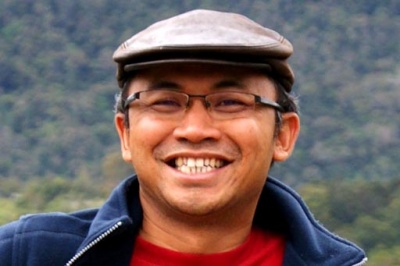Muridan Satrio Widjojo is not bitter or disappointed, even though he has been frequently denounced and discredited by his critics.
 JP/Septer Manufandu
JP/Septer Manufandu
Muridan’s goal is to convince government officials of the importance of engaging in peaceful dialogue to find comprehensive solutions to the protracted problems in Papua.
Recently Coordinating Political, Legal and Security Affairs Minister Djoko Suyanto, along with several other ministers and state officials, slammed him and his colleagues from the Indonesian Institute of Sciences (LIPI), rejecting the results of their research.
He received a similar response when presenting the research results to other relevant ministries and the Presidential Palace inner circle.
“We will continue to pursue all means, directly and indirectly, until Jakarta accepts the realities in Papua and acknowledges the urgency of initiating dialogue with the Papuan people to settle grievances peacefully,” Muridan told The Jakarta Post on Friday.
In 2004, President Susilo Bambang Yudhoyono assigned Muridan and a team of LIPI researchers to identify and research the most significant problems confronting the Papuan region. With moral support from informal figures and religious leaders in the provinces of Papua and West Papua, the team conducted the research and engaged in public consultation with locals. The results of the research have been published in a book titled Papua Road Map.
The book identifies four main problems in Papua: The unresolved status of Papua since its integration into Indonesia in 1962, political violence and human rights abuses, failed development in Papua and Jakarta’s inconsistent policies and marginalization of the Papuan people.
To understand Papuan issues and the real situation on the ground, one has to wear the Papuan people’s clothes and walk in their shoes, Muridan says.
The special autonomy granted by the government in 2001 is not the same as money. Giving money has worsened the socio-economic condition in Papua because a large part of the annual autonomy funds has gone directly into the pockets of public officials, while another large portion goes straight back to Jakarta, he said.
The government has also prevented Papuan authorities from issuing general and special rulings to grant affirmative action for indigenous people, to empower Papuan women, and to provide free healthcare and affordable education for native Papuans.
“Most native Papuans remain in remote jungles simply observing the developmental advancements of migrants,” he said, adding that the two provinces face HIV/AIDS epidemics that have infected and killed thousands.
He slammed decision makers for not only ignoring the real problems in Papua, but worse still, refusing to acknowledge that the problems actually existed. He believes both Jakarta and Papua have negotiated on premises of prejudice and mistrust.
“Accumulated disappointment with worsening social, economic and political conditions has led to Papuan demands for independence. Still, Jakarta continues to turn a deaf ear and a blind eye to the real problems in Papua, and instead they base their arguments on perceptions of secessionism,” Muridan who was born in Surabaya, East Java in 1967. said.
Frustration has been rising in Papua since the government rejected a 2008 decree from the Papuan People’s Assembly (MRP), which declared that all regional officials in Papua and West Papua must be indigenous Papuans.
He is optimistic that the problems can be solved without guns, and the time for dialogue will come. He believes now is the right time for the government to prevent future bloodshed and instead seize the opportunity to engage all Papuan factions in constructive dialogue, including those in exile.
Speaking Indonesian with a Papuan accent, Muridan said he and his team did not recommended a deadline for dialogue, but their work was the initial phase of a larger peace process seeking a comprehensive solution similar to that achieved in Aceh through the 2005 Helsinki peace agreement.
“Both sides need a peace mediator with the caliber of former president Jusuf Kalla and the former Finnish president Maarti Achtisari.”
Asked why he was interested in Papua, Muridan revealed he had spent a good part of his life working on Papuan affairs since joining LIPI in 1993.
First setting foot in Papua in 1993, Muridan’s mediating skills were challenged when he facilitated peace talks between two ethnic tribes in Kurima, Wamena.
“With the help of local figures and church ministers, we facilitated peace negotiations to settle a prolonged conflict among seven sub-ethnic confederations in the district.”
Muridan and two other LIPI researchers acquired 350 hectares of land in Wamena regency on the slopes of Mount Susu to be used as a botanical garden.
“As is the traditional custom in the regency, all sub-ethnic tribes claiming ownership rights to the mountain voluntarily gave the land for what now has become the Wamena Botanical Garden,” he said, adding that no one demanded land compensation.
After his success in Wamena, the government asked Muridan to facilitate peace talks to end the prolonged conflict between the Amungme and Komoro tribes in Timika in 1996. The conflict between the two tribes was triggered by the Amungme’s opposition to US mining company PT Freeport McMoran Indonesia’s decision to grant 1 percent of its annual profit to the seven tribes of Mimika. The Amungme accused six other tribes of conspiring with the Indonesian Army’s Special Forces (Kopassus) to maintain security around the large mining site.
After a series of dialogues, delegates from the two conflicting tribes finally accepted local customs and put down their arrows to end the conflict, he said.
“These precious field study experiences were the main source of material for my PhD dissertation at Leiden University in the Netherlands in 2007.”
Asked whether he was available and prepared to be a mediator in the proposed dialogue, he said both sides should agree to appoint someone receptive and capable of facilitating, monitoring and implementing a credible peace agreement.
